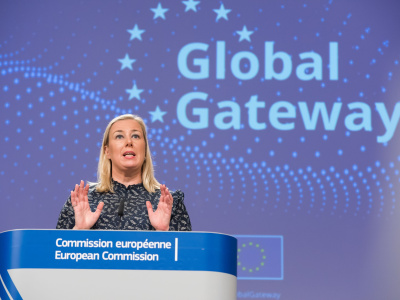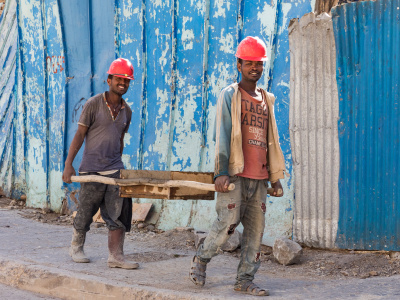
EPA Update, GREAT Insights, Volume 2, Issue 7 (October 2013)
All ACP ACP ministers meet in Brussels, Joint Ministerial Trade Committee addresses joint trade concerns The 97th ACP Ministerial Trade Committee met in Brussels on 9 – 10 October 2013 to discuss trade issues of common interest to the African Caribbean and Pacific (ACP) group.. The meeting was preceded by two days of talks amongst senior ACP trade officials. The following issues were discussed: (i) preparation for ACP’s participation at the 9th World Trade Organization (WTO) Ministerial meeting; (ii) state of play of Economic Partnership Agreements (EPA) negotiations and implementation; (iii) ACP-EU trade regime issues, in particular update of EC negotiations with third parties; non-tariff measures including Sanitary and Phyto-Sanitary Standards (SPS) issues; and commodities; (iv) EC forthcoming initiative regarding responsible sourcing of minerals from conflict-affected and high-risk areas; (v) trade-related capacity building programme; and (vi) enhancing intra-ACP trade relations. Ministers issued the ACP position in a declaration on the 9th Ministerial Conference where they emphasised the critical dimension of development, and in particular the importance of special and differential treatment (SDT) as laid out in the Doha Development Agenda. They called on Ministers to expedite work to conclude the modalities on the Monitoring Mechanism for SDT and to take stock of the agreement-specific proposals in Annex C of the Cancun Text. Ministers also urged WTO members to realise their commitments towards Least Developed Countries (LDCs), namely regarding Duty Free Quota Free (DFQF) market access to LDCs, improved rules of origin, and implementation of the LDC waiver on services and outstanding proposals on cotton. The declaration also reaffirmed the need to address the concerns of small and vulnerable economies, land-locked developing countries, small island developing states and low-lying coastal developing countries. Agriculture and trade facilitation were also key elements of the declaration. Regarding agriculture, Ministers showed strong commitments in support of a package that would support the interests of the ACP countries, in particular by addressing the imbalances in the WTO rules on agriculture that would ensure their own food security, while taking fully into account the concerns of net food importing countries. Finally, on trade facilitation, Ministers confirmed that although they were not demandeurs of the Trade Facilitation initiative in the WTO Doha Development Agenda, they remained firmly committed to a satisfactory and balanced outcome in the current negotiations, given the potential benefits of trade facilitation. Yet, the declaration also goes on to stress the “mandatory” Special and Differential Treatment and “required” technical and financial assistance. On Friday the 11th, ACP Ministers held an exchange of views with the European Commissioner for Trade, Karel de Gucht, for the Joint Ministerial Trade Committee (JMTC), an ACP-EU institution that meets on a yearly basis. The JMTC provides an ACP-EU-wide forum for discussion on trade matters of common concern. This year’s meeting is the 38th JMTC to be held. An earlier side event was organized by the African Union in Brussels, as a follow up to the African Union (AU) coordination meeting in Gabon (see our September edition of the EPA update). EPAs naturally feature on this year’s JTMC agenda. As we have reported in these columns, the pace of negotiations and regional concertations have picked up in view of the October 1st 2014 deadline for the withdrawal of temporary preferences for countries deemed not to be implementing their interim EPAs. A draft report of ACP senior officials seen by GREAT Insights highlights the demand to “sensitise” the EU “on the need to relax the implementation of the regulation”, while acknowledging that the deadline is real. Commissioner de Gucht, for his part, seemed to want to lower expectations that the October 2014 deadline could be relaxed or that an alternative arrangement could be found when he stated “I want to be clear on one point: there will be no new bridging measure” during his speech on Friday (1). Commissioner de Gucht also outlined the state of regional negotiations, describing them as “in much better shape than they are sometimes perceived to be”. Also on the agenda were other issues of interest to the group in its trading relations with the European block. These include EU relations with third parties, commodity issues, and Non-Tariff Barriers to trade including Sanitary and Phyto-Sanitary Standards. The European Commission gave a presentation on their initiative regarding the responsible sourcing of minerals from conflict-affected and high-risk areas. West Africa Region holds extraordinary Ministerial meeting, all eyes on Extraordinary Summit of ECOWAS Heads Of State and Government The West African region seems headed for a restart of Economic Partnership Agreement (EPA) negotiations on the basis of a new Market Access offer, nearly two years after the last meeting between West African negotiators and their European counterparts. This is the impression after the Economic Community of West African States (ECOWAS) held an Extraordinary Meeting of Ministers that ended late in the night of Monday September 30th in Abidjan, Cote d’Ivoire. The outcome document of the meeting, revealed by the koaci.ci website, mandates negotiators to go ahead with negotiations “on the basis of the new market access scenario”, which contains additional flexibility to break the current deadlock regarding the degree of liberalisation (2). Regular readers of these columns will recall that the region had been debating for many months whether to move from 70% market access opening to an offer standing around 75%. The EU has, up to this day, argued that 80% is the minimum threshold it will accept. Anything less could, in its eyes, be challenged at the WTO for being inconsistent with article XXIV of the General Agreement on Tariffs and Trade (GATT), which specifies that regional trade agreements should liberalise “substantially all trade”. The final decision, however, rests with ECOWAS Heads of State, who are scheduled to meet at the end of October in Dakar for an Extraordinary Summit of ECOWAS Heads and State and Government. The minister’s meeting in Abidjan was meant to lay the groundwork for Heads of State, and their decision could be altered come October 30th. Observers describe the Summit, which is supposed to seal a regional position on EPAs and the region’s Common External Tariff (CET), as a crossroads for ECOWAS. Regarding the CET, the outcome of the minister’s meeting give a few clues where that compromise might lie. Countries in the region have found it hard to harmonise their tariff rates in order to set up a CET. Wide differences exist between countries like Senegal and others like Nigeria which are, in comparison, more protective of their economies. As of a few months ago, negotiations were reportedly focusing on a handful of goods where the region could still not agree on harmonised rates. The conclusions from the meeting float the idea of allowing countries to maintain diverging rates on 3% of their tariff lines for five years. The divergence from CET rates should not exceed 70%. This would allow countries to start implementing the CET, and, essentially, put off implementation for the most sensitive products for a later date. Further, the implementation date seems to have been pushed back to 2015. It was originally conceived that the CET would be implemented by 2014. Another issue concerns the harmonisation of the two import taxes financing the functioning of the two regional Commissions (the ECOWAS Commission and the Union Economique et Monétaire Ouest Africaine Commission). The outcome document foresees the continued existence of two separate taxes for the two commissions, and engages in a review towards possible harmonisation in five years time. Previous documents and discussions had envisaged the creation of a single, harmonised tax set ECOWAS-wide. The EPA/CET process in the region has been unfolding at a rapid pace in the past months. With some countries alarmed at the removal of temporary European preferences for countries having signed Interim EPAs, the region has put all its efforts into finalising its CET and laying the basis of a compromise to renew negotiations on a regional EPA. It remains to be seen how the European Commission will receive the new West African offer. Apart from the offer itself, other problematic issues are still hampering progress in the negotiations towards a regional EPA. These include the MFN clause, and the “additionality” of financing the European Union would provide as part of the development package accompanying the EPA. Eastern African Community (EAC) GREAT had previously reported that the EAC and the European Commission were liaising on the possibility of organising a ministerial level meeting to consider “political” issues that have been left to the decision of ministers during the course of the negotiations. During his speech to the Joint Ministerial Trade Committee in Brussels, however, de Gucht hinted that the negotiations still required “political guidance” on some technical questions: “I would be delighted to find time to travel to East Africa for a conclusive round when our respective teams have resolved most of the open technical issues based on the expected political guidance”. Karel de Gucht further stressed that the main bottleneck to advancement of negotiations was to find time to organise a “stock taking” ministerial in Brussels or East Africa, in light of the fact that his “diary is filling up faster than I would like it to” ahead of the WTO ministerial and meetings with other trade partners. Southern African Development Community (SADC) Southern African Development Community (SADC) and EU negotiators held a weeklong negotiating session during the final week of September, but at the time of writing GREAT Insights could not get information on the substance of negotiations. Check our November issue for more information. Quentin de Roquefeuil is Policy Officer in the Economic Governance, Trade and Regional Integration, and Food Security Programmes at ECDPM. Isabelle Ramdoo is Deputy Head of Economic Governance, Trade & Regional Integration Programmes. Footnotes
- See http://trade.ec.europa.eu/doclib/docs/2013/october/tradoc_151849.pdf
- See http://koaci.com/articles-86083. To our knowledge, the new offer stands at 74.19% of liberalisation.




